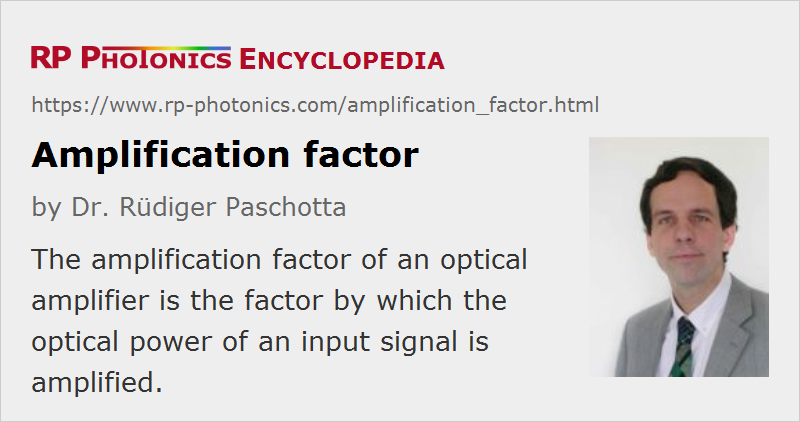Amplification Factor
Definition: the factor by which the power of a signal is amplified
Alternative term: gain factor
German: Verstärkungsfaktor
How to cite the article; suggest additional literature
Author: Dr. Rüdiger Paschotta
The amplification factor (or gain factor) of an optical amplifier is the factor by which the input power is amplified. It depends on various details of the gain medium and on the degree of its excitation, apart from the optical wavelength.
During amplification of an intense optical pulse, the amplification factor may drop due to gain saturation. An effective amplification factor may then be defined as the ratio of output energy and input energy.
An alternative specification of gain is in terms of decibels, calculated as 10 times the logarithm to base 10 of the amplification factor.
Questions and Comments from Users
Here you can submit questions and comments. As far as they get accepted by the author, they will appear above this paragraph together with the author’s answer. The author will decide on acceptance based on certain criteria. Essentially, the issue must be of sufficiently broad interest.
Please do not enter personal data here; we would otherwise delete it soon. (See also our privacy declaration.) If you wish to receive personal feedback or consultancy from the author, please contact him e.g. via e-mail.
By submitting the information, you give your consent to the potential publication of your inputs on our website according to our rules. (If you later retract your consent, we will delete those inputs.) As your inputs are first reviewed by the author, they may be published with some delay.
See also: gain, optical amplifiers, decibel
and other articles in the category optical amplifiers
 |




If you like this page, please share the link with your friends and colleagues, e.g. via social media:
These sharing buttons are implemented in a privacy-friendly way!